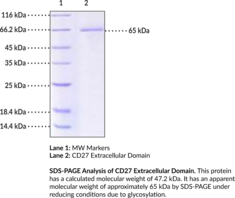Territorial Availability: Available through Bertin Technologies only in France
- Correlated keywords
- TNFRSF7-CD27 extra intra cellular super family trans membrane glyco protein NFkB costimulation
- Product Overview:
CD27, also known as tumor necrosis factor receptor superfamily receptor 7 (TNFRSF7), is a type I transmembrane glycoprotein with roles in T cell-mediated immunity.{59402,59403} It is comprised of an extracellular domain containing three cysteine-rich domains (CRDs), a transmembrane domain, and a short cytoplasmic domain that facilitates intracellular signaling.{59402} CD27 is expressed on a broad range of lymphocytes, including natural killer (NK), B, and T cells, with T cell CD27 expression increasing upon T cell receptor stimulation.{59405} Binding of homotrimeric CD70 to CD27 on antigen-primed T cells induces NF-kB and MAPK signaling through TNF receptor-associated factors (TRAFs) and, when the T cell is stimulated by other factors, induces PI3K signaling to induce the co-stimulation and expansion of naïve CD4+ and CD8+ T cells.{54194,59406} Knockout of CD27 reduces thymic development of regulatory T cell (Treg) precursors and enhances apoptosis of mature Tregs in mice. Levels of CD27-expressing plasma cells are increased in the periphery and positively correlate with the disease activity index and serum levels of anti-dsDNA autoantibodies in patients with systemic lupus erythematosus (SLE).{59404} Cayman’s TNFRSF7/CD27 Extracellular Domain (human, recombinant) protein can be used for binding assay applications. This protein is a disulfide-linked homodimer. The reduced monomer, comprised of CD27 (amino acids 21-192) fused to His-tagged human IgG1 Fc at its C-terminus, consists of 420 amino acids, has a calculated molecular weight of 47.2 kDa, and a predicted N-terminus of Thr21 after signal peptide cleavage. As a result of glycosylation, the monomer migrates at approximately 65 kDa by SDS-PAGE under reducing conditions.
Cayman Chemical’s mission is to help make research possible by supplying scientists worldwide with the basic research tools necessary for advancing human and animal health. Our utmost commitment to healthcare researchers is to offer the highest quality products with an affordable pricing policy.
Our scientists are experts in the synthesis, purification, and characterization of biochemicals ranging from small drug-like heterocycles to complex biolipids, fatty acids, and many others. We are also highly skilled in all aspects of assay and antibody development, protein expression, crystallization, and structure determination.
Over the past thirty years, Cayman developed a deep knowledge base in lipid biochemistry, including research involving the arachidonic acid cascade, inositol phosphates, and cannabinoids. This knowledge enabled the production of reagents of exceptional quality for cancer, oxidative injury, epigenetics, neuroscience, inflammation, metabolism, and many additional lines of research.
Our organic and analytical chemists specialize in the rapid development of manufacturing processes and analytical methods to carry out clinical and commercial GMP-API production. Pre-clinical drug discovery efforts are currently underway in the areas of bone restoration and repair, muscular dystrophy, oncology, and inflammation. A separate group of Ph.D.-level scientists are dedicated to offering Hit-to-Lead Discovery and Profiling Services for epigenetic targets. Our knowledgeable chemists can be contracted to perform complete sample analysis for analytes measured by the majority of our assays. We also offer a wide range of analytical services using LC-MS/MS, HPLC, GC, and many other techniques.
Accreditations
ISO/IEC 17025:2005
ISO Guide 34:2009
Cayman is a leader in the field of emerging drugs of abuse, providing high-purity Schedule I-V Controlled Substances to federally-licensed laboratories and qualified academic research institutions for forensic analyses. We are certified by ACLASS Accreditation Services with dual accreditation to ISO/IEC 17025:2005 and ISO Guide 34:2009.





